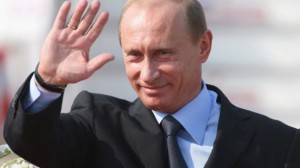 As Russia sped ahead with the annexation of Crimea and the US drew up more sanctions to punish Moscow, American and Russian officials were last week working side by side in Vienna as if unaffected by the unfolding drama of the new cold war.
As Russia sped ahead with the annexation of Crimea and the US drew up more sanctions to punish Moscow, American and Russian officials were last week working side by side in Vienna as if unaffected by the unfolding drama of the new cold war.Emerging from a round of international negotiations with Iran on downsizing its nuclear ambitions, US officials expressed satisfaction that their Russian colleagues had acted constructively.
Moscow, said a senior US official, had no interest in Iran obtaining a nuclear bomb or in an escalation in tensions in the Gulf. Moscow takes part in the Iran negotiations for its own interests, he noted, not those of the US.
Yet, it would be wishful thinking to assume that if the crisis over Ukraine continues to deteriorate it will not seep through Russian policy towards the Middle East and affect Iran, primarily because that is where the US would be hurt most.
Motivated by fierce nationalism and a deep sense of historic injustice, for which he blames the west, Russian president Vladimir Putin has been lashing out with little apparent regard for the consequences. If cornered, he will be tempted to use all the levers at his disposal to retaliate against western sanctions.
If you look at this rationally there no reason why Russians would want to undermine the [nuclear] talks in any way but?.?.?.?at this point you cant count on him [Putin] making calculations of cost and benefit, says Robert Einhorn, a former US negotiator with Iran.
Despite Russian good behaviour in Vienna, Moscows representatives departed with a warning shot, with a senior official saying that Russia might have to use the nuclear talks as an element in the game of raising the stakes.
Fyodor Lukyanov, a foreign policy expert in Moscow, says he expects a tightening of Russian relations with Iran and more intensive supplies of arms to Syria, where Moscow has been propping up the Assad regime.
Russia will see no reason at all to ease US troubles in the Middle East, Mr Lukyanov predicts.
But to what extent could Russia damage western interests? Withdrawing from the Iran nuclear talks would be futile. But Moscow could try to weaken western resolve and embolden Iran.
This is the one card that they [the Russians] have. The S-300 can be a game changer; it would reduce Israels ability to attack Iran- Cliff Kupchan, analyst at Eurasia Group
Experts are most worried about the potential for new Russian arms sales, in particular the long-range S-300 air defence missile system deal that was cancelled in 2010 under American pressure.
This is the one card that they [the Russians] have, argues Cliff Kupchan, analyst at Eurasia Group, the risk researchers and consultants. The S-300 can be a game changer; it would reduce Israels ability to attack Iran.
Also troubling, but with less impact, are possible Russian moves to undermine the sanctions regime that contributed to Tehrans decision to negotiate in the first place.
Moscow, for example, could give a green light for banks to resume transactions with entities in Tehran, or it could revive mooted trade accords opposed by the US.
A barter agreement allowing Iran to sell its oil to Russia in exchange for goods and equipment has been rumoured for months.
While some experts doubt such a strategy would be effective and Irans own oil ministry is said to be sceptical about the oil deal Mark Fitzpatrick, non-proliferation analyst at Londons International Institute for Strategic Studies, says breaking the oil embargo could encourage China and others to ignore the sanctions, and give Iran more incentive to maintain a hardline position in the talks.
This field of new possibilities is probably being closely studied in Tehran, where attempts to exploit divisions among world powers have long been a favoured tactic.
Iranian officials, however, also appear mindful that the east-west tensions could be a minefield. They have trod a cautious line in their reaction to Russias annexation of Crimea, with some commentators expressing hope that Europes need to reduce reliance on Russian gas offered opportunity for Irans struggling energy sector.
Despite the short-term benefits of closer ties with Russia, Irans objective in resolving the nuclear dispute is to fix its economy with western finance, investment and technology not tie it to a faltering Russian economy saddled with its own set of sanctions.
By Financial Times
The Iran Project is not responsible for the content of quoted articles.











